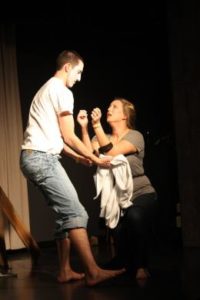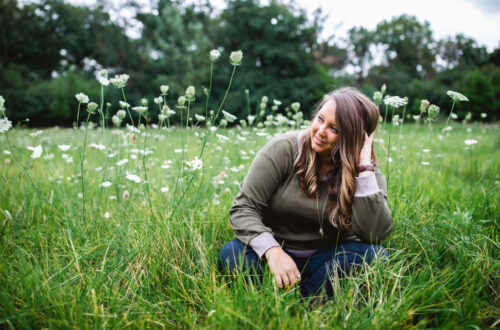Performing
A tall, big, and blue eyed girl with long brown hair and bangs is walking through her parents front yard, deep in her own imagination, singing “Part of Your World” from Disney’s The Little Mermaid unabashedly, snaps back to reality when her neighbor and older friend Lena comes over demanding they prepare for their upcoming show. They run over to Lena’s backyard, boom box in hand, ready for their trampoline choreography rehearsal. Soon, their tickets sell out and they are featured in a newspaper for their accomplishments in the local lemonade and performance business in order to acquire every Backstreet Boy paraphernalia known to man.
I wish I could say I stopped imagining myself as The Little Mermaid, or any other Disney Princess for that matter, but even as a 27 year old I embrace the idea that I could encapsulate the ideal (insert whichever character here). The fact of the matter is, the older I became the more I grew in my passion for performance art. Throughout middle school and high school, I became known as the girl who could easily make others cry, either in Speech performances or on the big stage. My dream of being on Broadway pushed its way forward in my mind. It was the ultimate goal to achieve. The end of high school came near and I had to pick my major in college to set the track for the rest of my life. Unfortunately, a Theatre major was not something that would get my parents to pay for my tuition, so I settled for a minor in it instead.
Setting foot on stage was always the dream, but I never realized that so much happened in the moments I prepared for and became each character. Though blocking and choreography were important, they became second nature as I began to access the feelings and motivations of the character. Your breath becomes their breath, and their words become your own. It can bring you elation to the point of flight or weigh you down, drowning you in guilt, fear, or anger.
Fast forward to my final spring in Seminary, my habit of being on stage laying by the wayside for the last three years, and I am required by my professor Dr. Ngan to read “The Art of Biblical Narrative” by Robert Alter. Previously, and to my dismay, my two worlds of the Church and Theatre were not two that combined easily, if at all. Though I became a Christian in high school, I believed myself to be essentially leading two different lives. The cultures themselves seemed to be at such opposite extremes that I couldn’t help but separate them and almost split myself in the process. However, I began to see Theatre in a very spiritual sense.
My first encounter with the combination of Theatre and Church was in the production of Parabole put on by the Independent Performing Arts Coalition at Truman State University. Through a strange mishap, I ended up playing the lead of Humanity, and the following year playing Judas. Parabole wasn’t your typical theatrical performance with dialog, but instead, a mime. Yes, I was a mime in college.  It was more than that, though. Our director, Meg Pattee, is an insanely talented dancer who helped me, not only as a performer, but as someone to challenge me in my own theology in performance and in my relationship with Christ in a way that no one ever had before. Our movements were the words that told a story, and the music drove the emotion that we could not speak. A full body experience, I truly can’t find words to describe what happened in each performance, but I believe the Spirit of Christ moved. It was in this performance that I felt myself connecting to something more than just another person, but to God. It was the first time I wasn’t worried about me and my performance…but purely the interaction with God in that moment representing all of Humanity. It changed my view of acting. I no longer wanted to just play a part, but recognize that this is someone’s story, someone’s life, someone’s purpose to share with others. I recognized when I was focused on me and my performance, I lost lines, I stopped feeling, I went on auto pilot. My spirit was no longer desiring God’s. It was only in my loss to self that I could truly reach a point of a “performance” worth having.
It was more than that, though. Our director, Meg Pattee, is an insanely talented dancer who helped me, not only as a performer, but as someone to challenge me in my own theology in performance and in my relationship with Christ in a way that no one ever had before. Our movements were the words that told a story, and the music drove the emotion that we could not speak. A full body experience, I truly can’t find words to describe what happened in each performance, but I believe the Spirit of Christ moved. It was in this performance that I felt myself connecting to something more than just another person, but to God. It was the first time I wasn’t worried about me and my performance…but purely the interaction with God in that moment representing all of Humanity. It changed my view of acting. I no longer wanted to just play a part, but recognize that this is someone’s story, someone’s life, someone’s purpose to share with others. I recognized when I was focused on me and my performance, I lost lines, I stopped feeling, I went on auto pilot. My spirit was no longer desiring God’s. It was only in my loss to self that I could truly reach a point of a “performance” worth having.
After reading Alter’s words, I came to a conclusion that there is more to Scripture than what meets the eye; and that silence is poignant and purposeful. To engage with Scripture, there needs to be an understanding of what is happening behind the scenes, an understanding of each person. To ask questions of why this story is here, why this person speaks (or doesn’t speak) is necessary. These silences need to be addressed and spoken for. The interaction with Scripture needs to go deeper than just thought, but become interaction. Why not become the Word, body, mind, character and all? If this is a spiritual point in which my soul glimpses God, even for an instant, isn’t it even worth trying…?
This is my story. This is my interaction. This is my experience. I don’t want to just leave it here. I want us to grapple this idea together. I want us to share, together, this topic of Theater and Spirituality. What has been your experience? What is your dream in performance? How has God moved through you in acting, directing or even participating as an audience member? Comment, interact with one another. Find this as a safe place to share joy or hurt or confusion in these experiences.
Silence.
Please stop what you are doing and turn off whatever it is you have playing in the background. Take a few breaths. Is your mind somewhere else? What do you see around you? What do you hear? What do you feel? What can you smell….taste? If you are anything like me, you are wishing you were sitting with your dog in your lap with coffee in your hand. That is what my dream is-to start off every morning just sitting with my dog and sipping coffee, watching the sunrise.
I’ve always wondered if someone were to write the story of my life, what they would include. Would they cover the big moments, like when my brother was born, when I started a relationship with Christ, when my high school friend died, when my parents got cancer, when I was accepted to college…would they even bother to put down the blissful mornings I had the chance to sit with my dog and sip coffee and watch the sunrise?
Are we just made up of moments of action? Is what I accomplish (or don’t accomplish) all I am defined by? Are they the only things to take note of? Maybe I’m wrong…but aren’t the most formative times in silence? When we allow ourselves to sit with our dog? Sip coffee? Watch the sun rise?
If theatre taught me anything, it’s that words are the things driving the scene. It’s the silence and what you do with it.
To engage with Scripture, there needs to be an understanding of what is happening behind the scenes, an understanding of each person. To ask questions of why this story is here, why this person speaks (or doesn’t speak) is necessary.
My first time on a real stage, my director Mrs. Madalinski, had to walk me through step by step what to do in complete silence. I thought if I had no words, what was the point of me being on the stage at all? As I grew as an actor, silence became my weapon. “Hold your moment!” was repeatedly shouted at me by my acting coach and mentor, Miss O. You see, silence allowed the words and actions to sink it; to make it all mean something. Silence allowed for a response. Silence allowed trust to be gained and emotion to be felt. Silence gave a voice to what could not be said.
Hagar is one of my favorite women in the Bible. Her story is that of total reliance on God. What an intimacy to share with our Creator…We see it in Genesis 16:13 “She gave this name to the LORD who spoke to her: ‘You are the God who sees me,’ for she said, ‘I have now seen the One who sees me.’” (Gen. 16:13 NIV). However, we don’t get her whole story. Hagar doesn’t even speak until she flees and is found by an angel of God in the desert. There are blank spaces where our minds can only wonder what happened. The power and grace of God is seen with her and then her story just stops. Her and her story go silent. Why? Why must our information be stopped there? Hers isn’t the only story that cuts out abruptly. We see it repeatedly throughout the Old and New Testament…
Might I be so bold to ask you to look at a story which the character is silenced. In this, take time to look at their interaction with God previous to their silence. What was it like? What was their purpose? See what might have happened after their silence from the information you already know. How did they interact with God from then on? What needed to be said through the silence? What more from their narrative can we learn without words or actions?
For now, I am going to focus on getting home so that in the morning, I can sit with my dog, sip coffee and watch the sunrise; bringing light into my apartment, giving me the early morning peace that other hours cannot. This silent interaction with God of just breath and light keeps me going. What will silence do for you?




